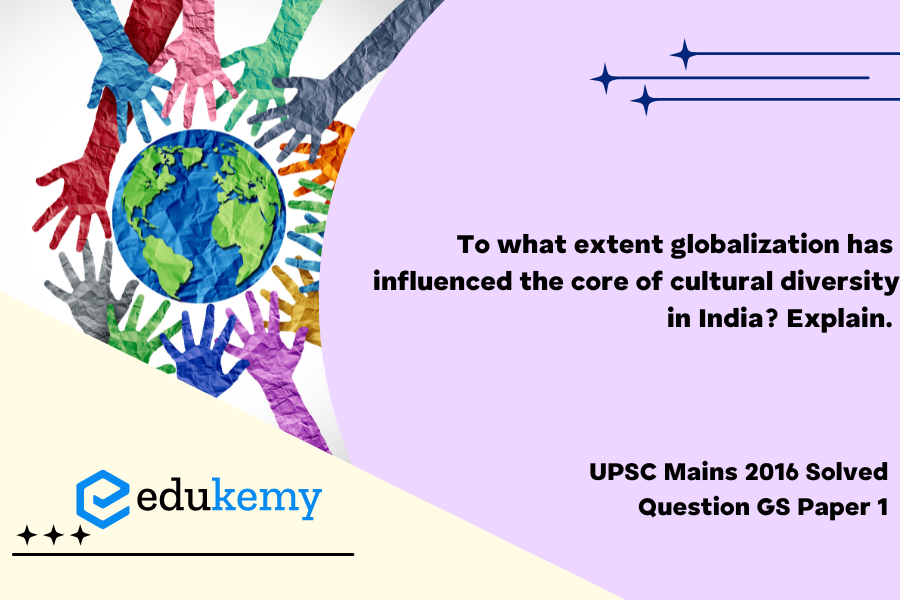Globalization has emerged as a transformative force, reshaping the socio-cultural fabric of nations across the globe. India, with its rich tapestry of diverse cultures, stands at the crossroads of this global phenomenon. The extent to which globalization has influenced the core of cultural diversity in India is a complex and multifaceted inquiry. On one hand, the interconnectedness facilitated by globalization has led to the exchange of ideas, traditions, and practices, fostering a globalized cultural landscape. The influx of international media, technology, and consumerism has blurred the boundaries between local and global influences, impacting the traditional cultural expressions of India. On the other hand, India has a resilient history of preserving its cultural identity, and many communities continue to safeguard their unique traditions. The juxtaposition of global homogenization and the assertion of cultural distinctiveness raises questions about the balance between adaptation and preservation. This essay will explore the various dimensions of how globalization has penetrated the core of cultural diversity in India, examining both the challenges it poses and the opportunities it presents for the dynamic evolution of India’s cultural mosaic.
Tag: Effects of globalization on Indian society.
Contents
Decoding the Question:
- In the Introduction, try to define globalization and briefly put both positive and negative aspects on Indian culture.
- In Body, elaborate the influence of globalization on the core of cultural diversity in India like family values, marriage, literature, etc.
- Concluding with statements like globalization is not a new concept, and it has been in existence since the beginning of Civilization.
Answer:
India is a diverse country and India’s greatness lies in its unique culture. Globalization is the process of expanding and accelerating the movement of ideas, people, capital, and the exchange of commodities (goods and services) over vast distances. India has also faced a significant impact on Indian cultural diversity in both positive and negative ways. The cultural effect of globalization leads to the fear that this process poses a threat to cultures in the world. At the same time, it would be a mistake to assume that the cultural consequences of globalization are only negative. Cultures are not static things. All cultures accept outside influences all the time.
Impact on the core of cultural diversity:

- Linguistic diversity: The influence of transnational corporations has resulted in a central common language mainly English, which dominates regional dialects, and minority languages. But it has a positive dimension, where it has led to Indians excelling in the services sector of the economy. Also, technology has helped preserve some of the dying artifacts, document local languages, and expose Indians to various global arts/movies, etc. For example, Flipkart and Amazon are selling tribal artifacts, Channapatna wooden toys, etc.
- Caste: Globalization has led to decreased emphasis on localized castes. Globalization has led to the rise of lower castes by making them aware of their rights. People eat together, and increased instances of inter-caste marriages are seen in the urban areas. However the socio-economic disparities in societies continue to cause conflicts, which are dominated by caste hegemony.
- Religious diversity: In a globalized world where increased prosperity and materialistic pursuits have decreased religion-based conflicts and superstition. It also led to questioning the age-old exploitative traditions like Devadasi and Triple-talaq. Also though India is multi-religious but is dominated by Hindus with globalization it has led to be polarized by a few religions. Also, exposed India to religious fundamentalism.
- Racial diversity: Globalisation to an extent has changed the racial demography to an extent with decreasing numbers of Mongoloid race. Migration within and outside India has to an extent changed the demography of Indian races.
- Women empowerment: Globalisation has attacked the discriminatory tendencies and patriarchal mindset in India. It has helped in getting rid of practices derogatory to women and has helped in the rise of women and exposure of women-related issues. E.g. Globalization has helped women to realize their rights and led to raising their voices against crimes like dowry.
Globalization is not a new concept. All through history, human societies have become steadily more interlinked. From ancient times, travelers, traders, priests, and pilgrims traveled vast distances for knowledge, opportunity, and spiritual fulfillment, or to escape persecution. They carried goods, money, values, skills, ideas, inventions, and even germs and diseases. Today, globalization is seen as western-centric and not through the world-centric approach, thus, it has both positive and negative influences on the core of cultural diversity in India.
In case you still have your doubts, contact us on 9811333901.
For UPSC Prelims Resources, Click here
For Daily Updates and Study Material:
Join our Telegram Channel – Edukemy for IAS
- 1. Learn through Videos – here
- 2. Be Exam Ready by Practicing Daily MCQs – here
- 3. Daily Newsletter – Get all your Current Affairs Covered – here
- 4. Mains Answer Writing Practice – here


